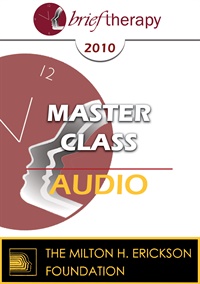
- Average Rating:
- Not yet rated
- Topic Areas:
- Master Classes | Ericksonian Hypnosis and Therapy Techniques | Self-Relations | Hypnotherapy | Psychotherapy
- Categories:
- Brief Therapy Conference | Brief Therapy Conference 2010
- Faculty:
- Stephen Gilligan, PhD | Jeffrey Zeig, PhD
- Duration:
- 2:44:28
- Format:
- Audio Only
- Original Program Date:
- Dec 13, 2010
- Short Description:
- Ericksonian hypnotherapy and the Self-Relations approach are experiential methods of change. In combination they can be synergistic. Psychotherapy is best when clients have a first hand experience of an alive therapeutic process. Such dynamic empowering experiences pave the way for dynamic understandings. Drs. Gilligan and Zeig will engage with each other and the participants to examine commonalities and differences in their work.
- Price:
- $15.00 - Base Price
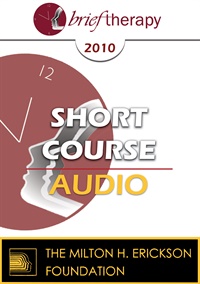
- Average Rating:
- Not yet rated
- Topic Areas:
- Animal Assisted Therapy | Cognitive Behavior Therapy (CBT) | Short Courses | Psychotherapy | Brief Therapy
- Categories:
- Brief Therapy Conference | Brief Therapy Conference 2010
- Faculty:
- Dale Klein-Kennedy, LPCC
- Duration:
- 57:15
- Format:
- Audio Only
- Original Program Date:
- Dec 09, 2010
- Short Description:
- This workshop will explore the human-animal bond and its history and will define and describe the use of Animal-Assisted Therapy (AAT) and Equine-Assisted Psychotherapy (EAP in working with domestic violence survivors, child-witnesses, families, children at risk and populations not benefiting from traditional therapies. In addition to the information presented about this brief therapy, participants will have the opportunity to view a video of AAT and EAP sessions. With Dale Klein-Kennedy.
- Price:
- $15.00 - Base Price

- Average Rating:
- Not yet rated
- Topic Areas:
- Couples Therapy | Short Courses | Intimacy | Relationships | Brief Therapy | Psychotherapy
- Categories:
- Brief Therapy Conference | Brief Therapy Conference 2010
- Faculty:
- Robert Johansen, PhD | Ian Johansen, PhD | Todd Gaffney, PhD
- Duration:
- 1:29:17
- Format:
- Audio Only
- Original Program Date:
- Dec 09, 2010
- Short Description:
- This workshop will introduce a new cognitive model for brief, solution-focused psychotherapy for couples. This cognitive paradigm is unique in several ways. It points to the fact that no one knows the client better than his/her intimate partner. The client’s partner pushes, pulls, and teases every imperfection of out their partner’s personality. Specifically, intimacy reveals what is incomplete about the client’s emotional development. It also reveals how effectively the client manages the needs he or she brings to the relationship. This is precisely what clients need to study themselves and points to what we as therapists can do to help our clients. With Robert Johansen, Ian Johansen and Todd Gaffnet.
- Price:
- $15.00 - Base Price
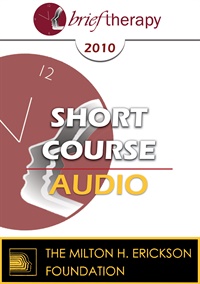
- Average Rating:
- Not yet rated
- Topic Areas:
- Psychotherapy | Short Courses | Ericksonian Psychotherapy | Ericksonian Hypnosis and Therapy Techniques
- Categories:
- Brief Therapy Conference | Brief Therapy Conference 2010
- Faculty:
- Maria Escalante de Smith, MA
- Duration:
- 1:27:11
- Format:
- Audio Only
- Original Program Date:
- Dec 09, 2010
- Short Description:
- Women who face unplanned pregnancies may experience a wide range of emotions and go through deep crises when they learn they are pregnant. In this workshop, the presenter will describe how brief Ericksonian interventions can help them explore possibilities and cope with their crises during unplanned pregnancy. Examples of quick interventions and conversational trance will be given as well. There will be references to the importance of hope and exercises for coming to terms with previous experience.
- Price:
- $15.00 - Base Price
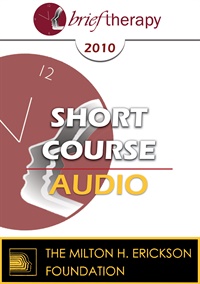
- Average Rating:
- Not yet rated
- Topic Areas:
- Short Courses | Meditation, Spirituality and Yoga | Mind-Body | Mindfulness | Multicultural | Belief Systems | Psychotherapy | Brief Therapy
- Categories:
- Brief Therapy Conference | Brief Therapy Conference 2010
- Faculty:
- Jeanne Hernandez
- Duration:
- 1:38:23
- Format:
- Audio Only
- Original Program Date:
- Dec 09, 2010
- Short Description:
- This workshop explores how the Indian belief system contains ingredients to keep the mind and body in harmony and promote wellbeing. We will explore adding into psychotherapy sessions totem strengths, shaman journeys, medicine wheels, time-frames, respect and gratitude; the circle of life, and symbols as reminders of the “right” path. With Jeanne Hernandez.
- Price:
- $15.00 - Base Price
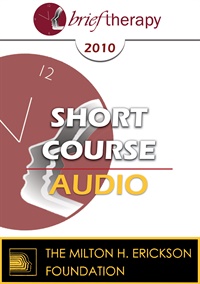
- Average Rating:
- Not yet rated
- Topic Areas:
- Cognitive Behavior Therapy (CBT) | Psychotherapy | Short Courses | Humor | Brief Therapy
- Categories:
- Brief Therapy Conference | Brief Therapy Conference 2010
- Faculty:
- Steve Sultanoff | Steven Sultanoff, Psychologist
- Duration:
- 1:26:25
- Format:
- Audio Only
- Original Program Date:
- Dec 09, 2010
- Short Description:
- Humor in the serious realm of psychotherapy? This lively presentation, filled with anecdotes and clinical illustrations, will explore the rationale for and practical application of humor in cognitive therapy. Both cognitive therapy and humor can create change in the central aspects of human experience—cognitions, emotions, behaviors, and physiology. The presenter will explore how humor can be a powerful tool for both diagnosis and treatment, and will differentiate between empathic and hostile styles of humor. With Steven Sultanoff.
- Price:
- $15.00 - Base Price
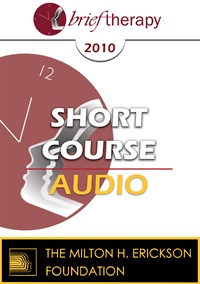
- Average Rating:
- Not yet rated
- Topic Areas:
- Psychotherapy | Short Courses | Strengths-Based
- Categories:
- Brief Therapy Conference | Brief Therapy Conference 2010
- Faculty:
- Steven Kuester
- Duration:
- 1:26:11
- Format:
- Audio Only
- Original Program Date:
- Dec 09, 2010
- Short Description:
- This workshop is designed to examine certain assumptions of traditional psychotherapies and to provide the participant with a powerful exposure to strength-based treatment. At the conclusion of the session, participants will have gained knowledge and expertise about incongruency versus congruency as a core component of successful treatment outcomes and the therapeutic relationship. With Steven Kuester.
- Price:
- $15.00 - Base Price
Tags: Psychotherapy Strengths-Based
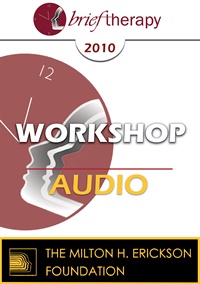
- Average Rating:
- Not yet rated
- Topic Areas:
- Psychotherapy | Workshops | Tailoring
- Categories:
- Brief Therapy Conference | Brief Therapy Conference 2010
- Faculty:
- John C. Norcross, PhD
- Duration:
- 2:25:09
- Format:
- Audio Only
- Original Program Date:
- Dec 10, 2010
- Short Description:
- BT10 Workshop 13 - Tailoring the Therapy Relationship to the Individual Client: Evidence-Based Practices - John C. Norcross, PhD Psychotherapy will maximize its effectiveness by targeting the most powerful sources of change: the therapeutic relationship and the patient him/herself. This workshop will provide demonstrably effective methods to tailor therapy relationships to individual patients. You will learn to reliably assess and rapidly apply 4 evidence-based methods (patient preferences, stages of change, reactance level, real-time feedback) for constructing the “relationship of choice.”
- Price:
- $15.00 - Base Price
Tags: Relationships
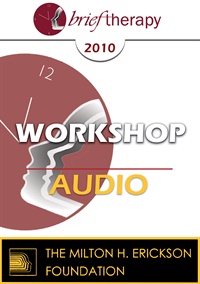
- Average Rating:
- Not yet rated
- Topic Areas:
- Psychotherapy | Workshops | Generative Psychotherapy
- Categories:
- Brief Therapy Conference | Brief Therapy Conference 2010
- Faculty:
- Stephen Gilligan, PhD
- Duration:
- 2:42:29
- Format:
- Audio Only
- Original Program Date:
- Dec 10, 2010
- Short Description:
- BT10 Workshop 18 - The Generative Self in Psychotherapy: How Higher States of Consciousness Can Transform Problems into Solutions - Stephen Gilligan, PhD The Generative Self approach emphasizes how the state of consciousness in which an experiential challenge is held determines whether a problem or solution develops. The model identifies three types of mind—Somatic, Cognitive, and Field—and how each mind can be operating at a Primitive, Ego, or Generative Level. We will see how a problem degrades a person’s consciousness level so that change is impossible, and how that low-level state can be improved to a Generative level, so that the problematic experience either spontaneously changes or is more easily engaged. Numerous practical techniques and clinical examples will be offered.
- Price:
- $15.00 - Base Price
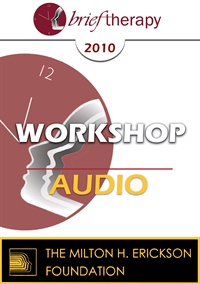
- Average Rating:
- Not yet rated
- Topic Areas:
- Meditation, Spirituality and Yoga | Psychotherapy | Workshops
- Categories:
- Brief Therapy Conference | Brief Therapy Conference 2010
- Faculty:
- Kathryn Rossi, PhD
- Duration:
- 2:44:03
- Format:
- Audio Only
- Original Program Date:
- Dec 10, 2010
- Short Description:
- BT10 Workshop 19 - Therapeutic Yoga: A New Brief Creative Psychotherapy - Kathryn Rossi, PhD This workshop is an introductory presentation of a new narrative approach to therapeutic yoga that can be used by everyone in everyday life. We build a neuroscience bridge between the Cartesian mind-body gap with positive therapeutic narratives that accompany classical yoga movements and the four stage creative process for resolving our ongoing life issues.
- Price:
- $15.00 - Base Price
Tags: Mind-Body
Please wait ...

